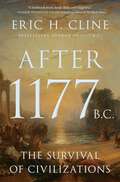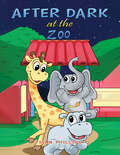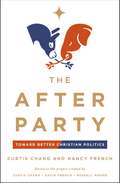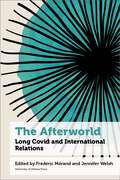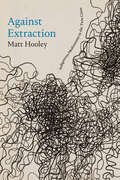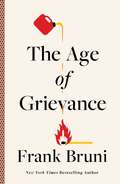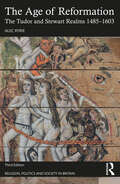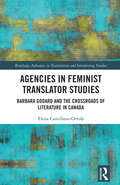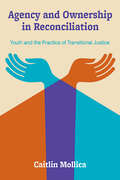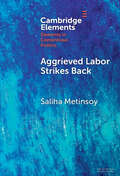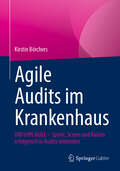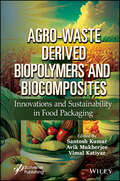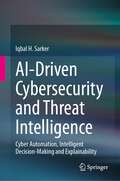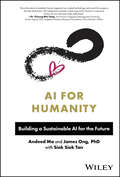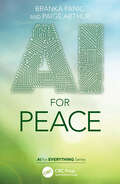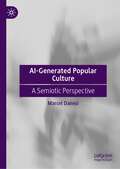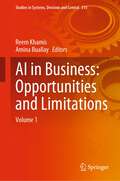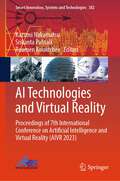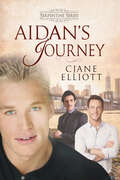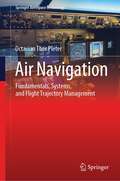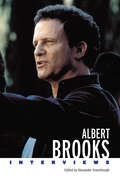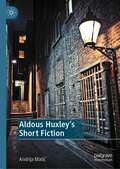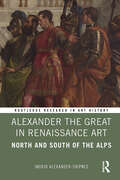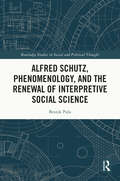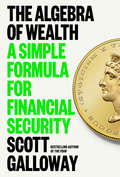- Table View
- List View
After 1177 B.C.: The Survival of Civilizations (Turning Points in Ancient History #12)
by Eric H. ClineIn this gripping sequel to his bestselling 1177 B.C., Eric Cline tells the story of what happened after the Bronze Age collapsed—why some civilizations endured, why some gave way to new ones, and why some disappeared forever&“A landmark book: lucid, deep, and insightful. . . . You cannot understand human civilization and self-organization without studying what happened on, before, and after 1177 B.C.&”—Nassim Nicholas Taleb, bestselling author of The Black SwanAt the end of the acclaimed history 1177 B.C., many of the Late Bronze Age civilizations of the Aegean and Eastern Mediterranean lay in ruins, undone by invasion, revolt, natural disasters, famine, and the demise of international trade. An interconnected world that had boasted major empires and societies, relative peace, robust commerce, and monumental architecture was lost and the so-called First Dark Age had begun. Now, in After 1177 B.C., Eric Cline tells the compelling story of what happened next, over four centuries, across the Aegean and Eastern Mediterranean world. It is a story of resilience, transformation, and success, as well as failures, in an age of chaos and reconfiguration.After 1177 B.C. tells how the collapse of powerful Late Bronze Age civilizations created new circumstances to which people and societies had to adapt. Those that failed to adjust disappeared from the world stage, while others transformed themselves, resulting in a new world order that included Phoenicians, Philistines, Israelites, Neo-Hittites, Neo-Assyrians, and Neo-Babylonians. Taking the story up to the resurgence of Greece marked by the first Olympic Games in 776 B.C., the book also describes how world-changing innovations such as the use of iron and the alphabet emerged amid the chaos.Filled with lessons for today's world about why some societies survive massive shocks while others do not, After 1177 B.C. reveals why this period, far from being the First Dark Age, was a new age with new inventions and new opportunities.
After Dark at the Zoo
by Siân PhillipsAs night falls on the zoo and the gates close behind the last visitor, a world of adventure stirs to life. Herbert, a keen-eyed inhabitant, quickly discovers the unlocked enclosures. Driven by curiosity, he ventures out, inviting fellow animals like Geoffrey and Ernie to join him. Together, they embark on a delightful exploration of their home after dark. After Dark at the Zoo is a heartwarming tale of friendship and discovery, inviting readers to follow Herbert and his companions on their nocturnal journey, full of sincerity and playful escapades.
The After Party: Toward Better Christian Politics
by Curtis Chang Nancy FrenchFor the exhausted, the hurting, and the faithful, The After Party helps reframe our political identity away from the "what" of political positions and toward the "how" being centered on Jesus.This paradigm-shifting book complements The After Party Project--a six-part, video-based, highly interactive curriculum that provides churches, small groups, and individuals with an on-the-ground, biblically based approach to a very complex topic.The After Party: Toward Better Christian Politics helps readers who feel despair about political divisiveness:Engage with others across political differencesLearn specific steps to reframe political identity outside of partisan dividesFocus on how we relate to one another as Jesus teaches before moving to the what of political topicsThe After Party is ideal for:Republicans, Democrats, and Independents looking for renewed hope and humility for our nationLocal leaders seeking to counter animosity toward political opponents, susceptibility to lies, and other practices that threaten the common goodCongregations, classes, and small groups watching The After Party video seriesPastors who want to encourage their congregants to trade their partisan mindsets for the mind of ChristIt's not too late. In today's political environment, faithfulness to a biblical how of political engagement shines as a radical challenge to both the Right and the Left. If you worry about what politics is doing to your community, your family, and your own well-being, The After Party will transform your political imagination.It's time for us to go beyond party politics and--as Christians--believe in the true "party" yet to come.
The Afterworld: Long COVID and International Relations (Health and Society)
by Anthony Amicelle Valérie Amiraux Vincent Arel-Bundock Ari Van Assche Daniel Béland Karim Benyekhlef Mark R. Brawley Dominique Caouette Allison Christians Ryoa Chung François Crépeau Pierre-Marie David Magdalena Dembińska Peter Dietsch Thomas Druetz Pearl Eliadis Philippe Fournier François Furstenberg Pablo Gilabert Timothy Hodges Maya Jegen Juliet Johnson Nicholas King Erick Lachapelle Justin Leroux Pierre Martin Sarah-Myriam Martin-Brûlé María Martín Iniesta Erik Martinez Kuhonta Theodore McLauchlin Frédéric Mégret Cynthia Milton Laurence Monnais Christian Novak Mme Mireille Paquet T. V. Paul Krzysztof Pelc Pierre-Olivier Pineau Vincent Pouliot René Provost Lee Seymour Thomas Soehl Maïka Sondarjee Samuel Tanner Jean-Philippe Thérien Hamish Van Ven Luna Vives Marie-Joëlle Zahar Alain GagnonLa COVID-19 a provoqué la crise mondiale la plus importante et la plus globale du 21e siècle. Pour certains, les répercussions ont été rapides et dramatiques, la pandémie poussant des dizaines de millions de personnes dans la pauvreté et générant une insécurité alimentaire extrême. Pour d’autres, les transformations bouillonnent encore sous la surface et des questions demeurent quant à savoir si les changements de société induits par la COVID-19 perdureront dans la période post-pandémique. Le retour de la géopolitique, avec la guerre en Ukraine et les tensions en Asie, complexifie le portrait mondial.Depuis mars 2020, on a vu une explosion d'analyses à propos de l'impact à court terme et des conséquences futures de la « longue COVID » sur les relations internationales. On a rapidement établi des parallèles établis avec l’effondrement de l'Europe des années 1930, raconté par Stefan Zweig dans ses célèbres mémoires, Le monde d’hier. Alors que la plupart des commentateurs font preuve de pessimisme, certains cherchent des lueurs de changement positif. Cette crise sans précédent exige de réfléchir à la manière dont, dans le « monde d’après », nous pouvons travailler à améliorer l'économie, la justice sociale, l'environnement, les relations entre les sexes, la santé et les institutions politiques - ou, à tout le moins, à faire en sorte qu'elles ne se détériorent pas davantage.Dans ce livre, 50 professeurs des quatre universités montréalaises, parmi les meilleurs experts de leur domaine, braquent le projecteur sur un défi spécifique : celui des relations internationales. À partir de leurs analyses, ils proposent des idées progressistes, pragmatiques et fondées sur les sciences sociales qui pourraient améliorer la coopération internationale, la sécurité et la prospérité durable après la fin de la pandémie.Note : Ce livre est publié en anglais aux Presses de l'Université d'Ottawa. La version originale de l'ouvrage est disponible aux Presses de l'Université de Montréal.
Against Extraction: Indigenous Modernism in the Twin Cities
by Matt HooleyIn Against Extraction Matt Hooley traces a modern tradition of Ojibwe invention in Minneapolis and St. Paul from the mid-nineteenth century to the present as that tradition emerges in response to the cultural legacies of US colonialism. Hooley shows how Indigenous literary and visual art modernisms challenge the strictures of everyday life and question the ecological, political, and cultural fantasies that make multivalent US colonialism seem inevitable. Hooley analyzes literature and art by Louise Erdrich, William Whipple Warren, David Treuer, George Morrison, and Gerald Vizenor in relation to histories of Indigenous dispossession and occupation, enslavement and Black life, and environmental harm and care. He shows that historical narratives of these cities are intimately bound up with the violence of colonial systems of extraction and that concepts like Indigeneity and sovereignty extend beyond treaty-granted promises of political control. These works, created in opposition and proximity to the extraction of cultural, political, and territorial resources, demonstrate how Indigenous claims to life and land matter to rethinking and unmaking the social and ecological devastations of the colonial world.
The Age of Grievance
by Frank BruniThe twists and turns of American politics today have become nearly impossible to predict, but the tone is a troubling given. It's one of grievance. A perilous share of Americans across the full breadth of the political spectrum respond to every big disappointment, every little frustration, every way in which the world doesn't hew precisely to their liking by deciding that they've been wronged, identifying the people responsible for that and raging at the injustice of it all. The blame game is the country's most popular sport and victimhood its most fashionable garb. <P><P> Grievance isn't always and necessarily bad. It has often done enormous good. The United States is a nation born of grievance, in the revolt of royal subjects unwilling to accept a bad deal, and across the nearly 250 years of our existence as a country, grievance has been the engine of morally urgent change. But what happens when all sorts of grievances—the greater ones, the lesser ones, the authentic, the invented—are jumbled together? When grievances become all-encompassing lenses, all-purpose reflexes, default settings? When people take their grievances to extreme and even violent lengths that they didn't before? <P><P> A violent mob storms the US Capitol, rejecting the results of a presidential election and embracing the fiction that it was rigged. Conspiracy theories flourish. Politicians appeal not to our better angels but to our worst impulses, encouraging selfishness instead of selflessness, trading inspiration for retribution. Fox News, the country's most watched cable news network, and Tucker Carlson, its sneering star, knowingly peddle lies in the service of profit. The Supreme Court loses touch with the country, overturning Roe v. Wade and shrugging off Clarence Thomas's transgressions. College students chase away speakers and college administrators dismiss instructors for dissenting from progressive orthodoxy. Will Smith slaps Chris Rock. And there's a potentially devastating erosion of the civility, common ground and compromise necessary for our democracy to survive. <P><P> How did we get here? What does it say about us, and where does it leave us? Timely, important, and enlightening, The Age of Grievance examines these critical questions and charts a path forward for a nation that may be growing tired of outrage. <p> <b>New York Times Bestseller</b>
The Age of Reformation: The Tudor and Stewart Realms 1485–1603 (Religion, Politics and Society in Britain)
by Alec RyrieNow in its third edition, The Age of Reformation has been fully updated and extended, offering a comprehensive study of the relationships between religion, politics, and social change in the sixteenth century.The book charts the new challenges and crises facing the English, Scottish, and Irish states in the early modern age as they contended with the spread of Protestantism and a powerful Tudor monarchy. Constructing a clear narrative of the events and actors of this era of reformations, both political and religious, the book provides an accessible entry point for studying a period of upheaval and transformation, synthesising key research and drawing unexpected connections. Each chapter of the third edition has been revised, with additions including expanded treatments of popular politics, the implementation of the Reformation in the parishes, and England’s global expansion and the Tudor roots of the ‘British empire’.Accompanied by new maps and drawing on the latest research, this book is essential reading for all students of religion, reformation, and politics in early modern British history.
Agencies in Feminist Translator Studies: Barbara Godard and the Crossroads of Literature in Canada (ISSN)
by Elena Castellano-OrtolàThis book sets out a new framework for a feminist history of translators, drawing on the legacy of Canadian scholar Barbara Godard and her work in establishing the Canadian literary landscape as a means of exploring agency in feminist translation studies and its implications for cross-disciplinary debates.The volume is organised in three sections, establishing feminist translator studies as its own approach, examining these dynamics at work in a comprehensive portrait of Barbara Godard’s scholarly and literary history, and looking ahead to future directions. In situating the discussion on Godard and Canadian literary history, Elena Castellano calls attention to a geographic context in which translation and its practice has been at the heart of debates around national identity and intersected with the rise of feminism and feminist literary scholarship. The book demonstrates how an in-depth exploration of the agency of an individual stakeholder, whose activities spanned diverse communities and oft conflicting interests, can engage in key questions at the intersection of nation-making, translation, and feminism, paving the way for future research and the further development of feminist translator studies as methodological framework.This book will be of interest to scholars in translation studies, feminist literature, cultural history, and Canadian literature.
Agency and Ownership in Reconciliation: Youth and the Practice of Transitional Justice
by Caitlin MollicaThe importance of youth's substantive participation for the realization of inclusive reconciliation practices has rarely been acknowledged. Agency and Ownership in Reconciliation provides a comprehensive, nuanced, and empirical account of the contribution of young people's voices to the success of transitional justice and peacebuilding practices. Caitlin Mollica illustrates the role of political will and agency in the development of transitional justice mechanisms that are substantively inclusive of those traditionally marginalized by post-conflict institutions, most notably youth. In doing so, she highlights the importance of youth to lasting peace and meaningful justice. She does so by looking specifically at how truth and reconciliation commissions from South Africa to the Solomon Islands engage with the voices of youth and the meanings youth self-ascribe to their experiences during truth and reconciliation commission processes. In a field which traditionally prioritizes stories about youth, Agency and Ownership in Reconciliation looks to center stories by youth.
Aggrieved Labor Strikes Back: Inter-sectoral Labor Mobility, Conditionality, and Unrest under IMF Programs (Elements in Contentious Politics)
by null Saliha MetinsoyWhy do we see large-scale labor protests and strikes under some IMF programs such as in Greece in 2010 and not in others such as in Ireland in the same year? This Element argues that extensive labor market reform conditions in an immobile labor market generate strong opposition to programs. Labor market reform conditions that decentralize and open up an immobile labor market cause workers either to lose in terms of rights and benefits, while being stuck in the same job or to fall into a less protected sector with fewer benefits. Conversely, in more mobile labor markets, wage and benefit differentials are low, and movement across sectors is easier. In such markets, labor groups do not mobilize to the same extent to block programs. The author tests this theory in a global sample and explores the causal mechanism in four case studies on Greece, Ireland, Latvia, and Portugal.
Agile Audits im Krankenhaus: DIN trifft AGILE - Sprint, Scrum und Kaizen erfolgreich in Audits einbinden
by Kirstin BörchersAudits im Krankenhaus werden oft noch sehr dokumentenlastig und auf ISO-Konformitätsprüfung ausgerichtet durchgeführt. Dabei geht es in Zeiten von E-Health, Digitalisierung und künstlicher Intelligenz (KI) im Krankenhaus längst um mehr und es ist vor allem eine flexiblere Herangehensweise gefordert. Die aktuellen Transformationsprozesse benötigen schnellere und dynamischere Anpassungen in der Organisation und bei den Abläufen. Mit Hilfe von agilen Audit-Instrumenten wie Scrum, Kaizen und Kanban können diese Herausforderungen gemeistert werden.Dieses Buch stellt nach einer Einführung in die Grundlagen von Audits die wichtigsten agilen Werte, Praktiken und Methoden vor, erläutert ihren möglichen Einsatz im Rahmen des allgemeinen Auditprozesses wie auch in den sogenannten „Audits im Sprint“. Agilität im Qualitätsmanagement und in der Durchführung interner Audits steht nicht im Widerspruch zum Leitfaden ISO 19011 „Auditierung von Managementsystemen“, in dem es um dieWirksamkeit und Eignung des QM-Systems sowie dessen Chancen zur Weiterentwicklung geht – sie ist vielmehr eine konsequente Weiterentwicklung. Best-Practice-Beispiele veranschaulichen, wie eine konkrete Umsetzung im Krankenhausumfeld aussehen kann.
Agro-Waste Derived Biopolymers and Biocomposites: Innovations and Sustainability in Food Packaging
by Santosh Kumar Avik Mukherjee Vimal KatiyarAGRO-WASTE DERIVED BIOPOLYMERS AND BIOCOMPOSITES This comprehensive book describes the fundamental principles and major advancements in the utilization of agro-waste for deriving biopolymers, and their applications to fabricate composite, nanocomposite, and hybrid food packaging films and coatings. The book serves as a complete, systematic, comprehensive account of the contemporary developments in the area of novel and environment-friendly valorization of agro- and food wastes into value-added products like biodegradable polymer and active functional agents for food packaging applications. It also describes the hurdles and challenges in the commercialization of these novel biopolymer-based materials, including their composites, their applications, safety, and legal ramifications. This book consists of fifteen chapters covering different aspects of agro- and food waste utilization, the development of biodegradable polymers, and their composites for sustainable food packaging applications. The first thirteen chapters detail the processing of various agro- and food wastes of plant and animal origin to synthesize different biopolymers, such as starch, cellulose, chitosan, silk proteins, pectin, etc., and their applications for the fabrication of sustainable food packaging materials and composites that are attractive alternatives to synthetic plastic packaging. These chapters also summarize the effectiveness of these biopolymers and their composites in developing active films and edible coatings for shelf-life extension and preservation of perishable foods. A chapter is devoted to issues of biodegradability, including analyses of various biodegradation reactions, such as depolymerization, mineralization, biochemical, and abiotic degradation both in soil and aquatic environments. The book concludes with a chapter addressing the concerns associated with the possible migration of components or additives from these biodegradable packaging into packaged food items. Audience The primary audience for this book is researchers, scientists, and engineers working in food science and technology, food engineering and technology, food biotechnology, sustainable food packaging, etc. Additionally, food entrepreneurs and associated businesses, such as the packaging and coatings industries, will also have a keen interest in the book.
AI-Driven Cybersecurity and Threat Intelligence: Cyber Automation, Intelligent Decision-Making and Explainability
by Iqbal H. SarkerThis book explores the dynamics of how AI (Artificial Intelligence) technology intersects with cybersecurity challenges and threat intelligence as they evolve. Integrating AI into cybersecurity not only offers enhanced defense mechanisms, but this book introduces a paradigm shift illustrating how one conceptualize, detect and mitigate cyber threats. An in-depth exploration of AI-driven solutions is presented, including machine learning algorithms, data science modeling, generative AI modeling, threat intelligence frameworks and Explainable AI (XAI) models. As a roadmap or comprehensive guide to leveraging AI/XAI to defend digital ecosystems against evolving cyber threats, this book provides insights, modeling, real-world applications and research issues. Throughout this journey, the authors discover innovation, challenges, and opportunities. It provides a holistic perspective on the transformative role of AI in securing the digital world.Overall, the useof AI can transform the way one detects, responds and defends against threats, by enabling proactive threat detection, rapid response and adaptive defense mechanisms. AI-driven cybersecurity systems excel at analyzing vast datasets rapidly, identifying patterns that indicate malicious activities, detecting threats in real time as well as conducting predictive analytics for proactive solution. Moreover, AI enhances the ability to detect anomalies, predict potential threats, and respond swiftly, preventing risks from escalated. As cyber threats become increasingly diverse and relentless, incorporating AI/XAI into cybersecurity is not just a choice, but a necessity for improving resilience and staying ahead of ever-changing threats. This book targets advanced-level students in computer science as a secondary textbook. Researchers and industry professionals working in various areas, such as Cyber AI, Explainable and Responsible AI, Human-AI Collaboration, Automation and Intelligent Systems, Adaptive and Robust Security Systems, Cybersecurity Data Science and Data-Driven Decision Making will also find this book useful as reference book.
AI for Humanity: Building a Sustainable AI for the Future
by Andeed Ma James Ong Siok Siok TanCapture the value of cutting-edge AI while mitigating its most salient risks AI For Humanity: Building a Sustainable AI for the Future delivers an incisive and timely discussion of how to design, build, and implement cutting-edge AI in for-profit firms and other organizations in a responsible, sustainable, and ethical way. The book walks you through the three pillars of human-focused AI development—governance, technology, and commercialization—and dives deep into each one, showing you how to create AI products and services that better humanity and advance universally held values. You'll find methodologies and frameworks that mitigate against some of the most profound and unsettling risks of unchecked artificial intelligence development, and roadmaps to help you avoid the numerous pitfalls and traps awaiting unsuspecting companies, managers, and executives. You'll also discover: Real-world case studies, from companies including SAP, Huawei, and Tencent, demonstrating the actual dilemmas and questions firms face when developing and implementing this extraordinary tech Actionable commitments you can make to help ensure you and your company avoid the ethical and reputational risks associated with AI Strategies for AI product and service development consistent with sustainable growth Perfect for managers, executives, directors, and other business leaders with a stake in responsible artificial intelligence design, development, and implementation, AI For Humanity will also interest regulators, academics, thought leaders, and policy makers doing their best to capture AI's substantial potential value while mitigating its most serious risks.
AI for Peace (AI for Everything)
by Branka Panic Paige ArthurThe role of artificial intelligence in war is widely recognized, but is there also a role for AI in fostering peace and preventing conflict? AI for Peace provides a new perspective on AI as a potential force for good in conflict-affected countries through its uses for early warning, combating hate speech, human rights investigations, and analyzing the effects of climate change on conflict. This book acts as an essential primer for introducing people working on peacebuilding and conflict prevention to the latest advancements in emerging AI technologies and will act as guide for ethical future practice. This book also aims to inspire data scientists to engage in the peacebuilding and prevention fields and to better understand the challenges of applying data science in conflict and fragile settings.
AI-Generated Popular Culture: A Semiotic Perspective
by Marcel DanesiThis book gives a general overview of Artificial Intelligence as it is impacting on the world of the arts and culture. What is AI-generated pop culture? What does a movie, a musical work, a novel, or song created entirely by a generative AI imply in terms of our notions of creativity? What is the semiotic dynamic (the meaning-making impulse that humans imprint in sign and textual forms) that is involved in an AI-produced work? No comprehensive treatment exists of the profound implications that AI-generated pop culture entails, including how it might affect cultural evolution and how we interpret artistic artifacts. Such a treatment is critical at this moment, and this book aims to fill this gap.
AI in Business: Volume 1 (Studies in Systems, Decision and Control #515)
by Reem Khamis Amina BuallayThis book is a comprehensive guide to understanding the potential of artificial intelligence (AI) in improving business functions, as well as the limitations and challenges that come with its implementation. In this book, readers will learn about the various opportunities that AI presents in business, including how it can automate routine tasks, reduce errors, and increase efficiency. The book covers a range of topics, including how AI can be used in financial reporting, auditing, fraud detection, and tax preparation. However, the book also explores the limitations of AI in business, such as the need for skilled professionals, data quality, and the potential for bias. It examines the challenges that companies face when implementing AI in business functions, including the need for ethical considerations, transparency, and accountability. The book is written for business professionals, business leaders, and anyone interested in the potential of AI in business functions. It offers practical advice on how to implement AI effectively and provides insights into the latest developments in AI technology. Through case studies and real-world examples, readers will gain a deeper understanding of how AI can be used to enhance business functions, as well as the potential pitfalls and limitations to be aware of. Overall, "AI in Business: Opportunities and Limitations" is an essential guide for anyone looking to harness the power of AI to improve their business functions, and to stay ahead in an increasingly competitive business environment.
AI Technologies and Virtual Reality: Proceedings of 7th International Conference on Artificial Intelligence and Virtual Reality (AIVR 2023) (Smart Innovation, Systems and Technologies #382)
by Kazumi Nakamatsu Srikanta Patnaik Roumen KountchevThis book gathers a collection of selected works and new research results of scholars and graduate students presented at the 7th International Conference on Artificial Intelligence and Virtual Reality (AIVR 2023) held in Kumamoto, Japan during July 21-23, 2023. The focus of the book is interdisciplinary in nature and includes research on all aspects of artificial intelligence and virtual reality, from fundamental development to the applied system. The book covers topics such as system techniques, performance, and implementation; content creation and modelling; cognitive aspects, perception, user behaviour; AI technologies; interactions, interactive and responsive environments; AI/VR applications and case studies.
Aidan's Journey
by CJane ElliottSequel to Serpentine WallsThe star of the University of Virginia theater department, Aidan Emery is lusted after and admired for living out and proud. He uses his talent and good looks to his advantage and never sleeps with the same guy twice. But his glamorous patina has been carefully honed to hide the pain he carries inside. Aidan wasn't always such a player. He starts college naively romantic, hungry for the attention he can’t get from his workaholic father and mentally ill mother. Unfortunately, that leaves him ripe pickings for predatory professor Rodney Montgomery. Rodney’s flattering regard seduces Aidan into a dysfunctional relationship that destroys his innocence.Life looks up for Aidan when he finally breaks free of Rodney’s pull and moves to New York City to make it as an actor. Meeting sweet fellow actor Patrick Jaymes seems like the start of a fairy tale. But before Aidan can rebuild his life into happily ever after, family secrets rip him wide open, leaving him easy prey when Rodney decides he’s not willing to let Aidan go.NOTE: This book contains references to mental illness, depression, suicidal ideation but not actual suicide, and emotional abuse from an unequal power dynamic.
Air Navigation: Fundamentals, Systems, and Flight Trajectory Management (Springer Aerospace Technology)
by Octavian Thor PleterThis book takes a new approach to air navigation, extending the classic scope of positioning and guidance to efficient and safe 4D flight trajectory management. Modern air navigation aims at flight trajectories optimisation. There is an infinite number of solutions to the classic navigation problem of flying from one airport to another, but most of them are wasteful of resources and even risky. Minimising all costs and risks incurred by the 4D flight trajectory makes air navigation both efficient and safe, which are key factors in air navigation services. Beyond minimising fuel burn and CO2, efficiency addresses non-CO2 emissions and noise. This is a visually intensive book, using examples and case studies to illustrate the concepts, the physics of navigation and the mathematical models involved. Numerical examples reflect its problem-solving nature. It is useful to aerospace students, engineers, pilots, air traffic controllers, technicians, and scientists curious about aviation.
Albert Brooks: Interviews (Conversations with Filmmakers Series)
by Alexander GreenhoughAlbert Brooks: Interviews brings together fourteen profiles of and conversations with Brooks (b. 1947), in which he contemplates, expounds upon, and hilariously jokes about the connections between his show business upbringing, an ambivalence about the film industry, the nature of fame and success, and the meaning and purpose of comedy. Throughout all these encounters, Brooks expresses an unwavering commitment to his own artistic expression as a filmmaker and a rejection of mainstream conventions. With his questioning and critical disposition, nothing seems certain for Albert Brooks except for the integrity of art and the necessity for a wry skepticism about the incongruities of everyday life in corporate America. Brooks is neither a Hollywood insider nor an outsider. He’s somewhere in-between. Since the early 1970s, this inimitable actor-writer-director has incisively satirized the mass media system from within. After initial work as an inventive comedian, both live and on network television, Brooks contributed six shorts to the first season of Saturday Night Live, which earned him a cult following for their avant-garde form and sensibility. These were followed by his feature debut, Real Life, the first of only seven films—including Modern Romance, Lost in America, and Defending Your Life—that Brooks has directed to date. His limited output reflects not only the difficulty in financing idiosyncratic films, but equally the exacting seriousness which Brooks has in making audiences laugh and think at the same time.
Aldous Huxley's Short Fiction
by Andrija MatićAldous Huxley’s Short Fiction analyzes Huxley’s short stories within a modernist context, highlighting that he shared more characteristics with distinguished modernists than is usually believed. The book also explores other features of Huxley’s short stories, focusing on themes such as consumerism, mainstream education, shallow intellectualism, women’s emancipation, toxic masculinity, and sensational journalism, themes that correspond with both Huxley’s time and our world, and position him among the most prophetic authors of the twentieth century. This study demonstrates that Huxley’s short fiction can provide answers to questions that remain confusing or partially explained in the research on Huxley’s work. It illustrates the constants and changes in Huxley’s opinions on organized religion, mysticism, and the relation between sexuality and spirituality, while also clarifying Huxley’s political opinion, which is often misunderstood due to his advocacy of pacifism. Finally, the in-depth interpretations of Huxley’s short stories reveal the dynamics of his literary style, especially his complex humor and irony, areas he developed more than any other modernist author of short fiction.
Alexander the Great in Renaissance Art: North and South of the Alps (Routledge Research in Art History)
by Ingrid Alexander-SkipnesThis volume explores the images of Alexander the Great from the fifteenth and sixteenth centuries, how they came about, and why they were so popular.In contrast to the numerous studies on the historical and legendary figure of Alexander, surprisingly few studies have examined, in one volume, the visual representation of the Macedonian king in frescoes, oil paintings, engravings, manuscripts, medals, sculpture, and tapestries during the Renaissance. The book covers a broad geographical area and includes transalpine perspectives. Ingrid Alexander-Skipnes examines the role that humanists played in disseminating the stories about Alexander and explores why Alexander was so popular during the Renaissance. Alexander-Skipnes offers cultural, political, and social perspectives on the Macedonian king and shows how Renaissance artists and patrons viewed Alexander the Great.The book will be of interest to scholars working in art history, Renaissance studies, ancient Greek history, and classics.
Alfred Schutz, Phenomenology, and the Renewal of Interpretive Social Science (Routledge Studies in Social and Political Thought)
by Besnik PulaIn recent decades, the historical social sciences have moved away from deterministic perspectives and increasingly embraced the interpretive analysis of historical process and social and political change. This shift has enriched the field but also led to a deadlock regarding the meaning and status of subjective knowledge. Cultural interpretivists struggle to incorporate subjective experience and the body into their understanding of social reality. In the early twentieth century, philosopher Alfred Schutz grappled with this very issue. Drawing on Edmund Husserl’s phenomenology and Max Weber’s historical sociology, Schutz pioneered the interpretive analysis of social life from an embodied perspective. However, the recent interpretivist turn, influenced by linguistic philosophies, discourse theory, and poststructuralism, has overlooked the insights of Schutz and other phenomenologists. This book revisits Schutz’s phenomenology and social theory, positioning them against contemporary problems in social theory and interpretive social science research. The book extends Schutz’s key concepts of relevance, symbol relations, theory of language, and lifeworld meaning structures. It outlines Schutz’s critical approach to the social distribution of knowledge and develops his nascent sociology and political economy of knowledge. This book will appeal to readers with interests in social theory, phenomenology, and the methods of interpretive social science, including historical sociology, cultural sociology, science and technology studies, political economy, and international relations.
The Algebra of Wealth: A Simple Formula for Financial Security
by Scott GallowayA must-have guide to optimizing your life for wealth and success, from bestselling author, NYU professor, and co-host of the Pivot podcast Scott Galloway.Today's workers have more opportunities and mobility than any generation before. They also face unprecedented challenges, including inflation, labor and housing shortages, and climate volatility. Even the notion of retirement is undergoing a profound rethink, as our life spans extend and our relationship with work evolves. In this environment, the tried-and-true financial advice our parents followed no longer applies. It's time for a new playbook.In The Algebra of Wealth, Galloway lays bare the rules of financial success in today's economy. In his characteristic unvarnished, no-BS style, he explains what you need to know in order to better your chances for economic security no matter what. You&’ll learn:How to find and follow your talent, not your passion, when making career decisionsHow to ride and optimize big economic waves (hard truth: market dynamics always trump individual achievement)What small steps you can take that pay big returns later, including diversification and tax planningHow stoicism can help you minimize spending and develop better financial habitsBursting with practical, game-changing advice from one of the world&’s most popular business school professors, The Algebra of Wealth is the practical guidebook you need to win today&’s wealth game.
